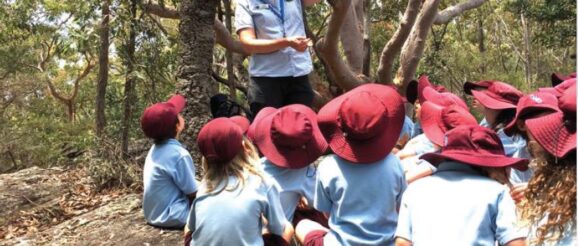From crisis comes innovation to change nature of environmental education :: New South Wales Teachers Federation

One area of the NSW public school system particularly affected by COVID- 19 restrictions was the state’s 25 environmental and zoo education centres.
The centres are NSW public schools staffed by NSW Department of Education teachers, more than 40 of whom are Federation members. The centres’ teachers give support to schools by providing resources to help integrate environmental education across a variety of different subject areas. They offer professional learning opportunities for teachers and, most importantly, run excursion programs for visiting school groups that are linked to NSW syllabuses, utilising the unique features of each centre’s location.
The latter of course was very quickly off limits in 2020. Like their colleagues in every other public school setting in the state, Federation members like Jill Bell from the Royal National Park Environmental Education Centre, worked incredibly hard to make the rapid transition to online learning in a matter of days.
Jill developed Google Sites to compile hundreds of resources created by teachers from across the network of centres to support teaching and learning from home.
Environmental and zoo education centre teachers made resources available for both primary and secondary schools across a range of different syllabuses, including science and geography. Other resources were targeted at improving students’ wellbeing.
Jill said: “When excursions were put on hold due to COVID-19, our network wanted to provide resources to support students, teachers and caregivers to ease the challenge of teaching and learning from home.”
The remote learning phase was eventually followed by COVID-safe incursions where environmental and zoo education centre teachers would bring their program into mainstream settings.
As coronavirus restrictions eased, excursions recommenced. Teachers in the centres are now working hard to deliver excursions that meet both NSW Health and Department of Education guidelines.
Jill said: “It is such a joy to have students back at the centre, but we understand that not every school community is ready to venture out. We will continue to support schools in every way we can … through COVID-safe excursions, incursions and online resources.”
Jill’s work in supporting all teachers and students to successfully transition to remote learning earned her a highly commended at the recent Sustainable Schools NSW Teacher of the Year Award.
The entire environmental and zoo education centre network was recognised with a Secretary’s Award for an Outstanding School Initiative for their remote learning resources, accessible to all.
Jill’s school, the Royal National Park Environmental Education Centre was also acknowledged as a T4L All Star for their Google Sites for online learning.
Sustainability is one of the three cross-curriculum priorities that is incorporated in all NSW syllabuses. The education centre network certainly does a large share of the work in the development of resources and content for teaching and learning about sustainability.
Environmental education consultants that supported sustainability teaching were removed in the massive cuts to so-called “back-office” staff under the Liberals and Nationals government’s Local Schools, Local Decisions reforms.
To further inform Federation policy and campaigns in this area a member survey (research.net/r/teaching-sustainability) is canvasing members’ views on the adequacy and availability of professional learning opportunities and teaching materials that support learning about sustainability.
To find out more about environmental and zoo education centres, including their locations, resources and online learning visit bit.ly/eandzec.
